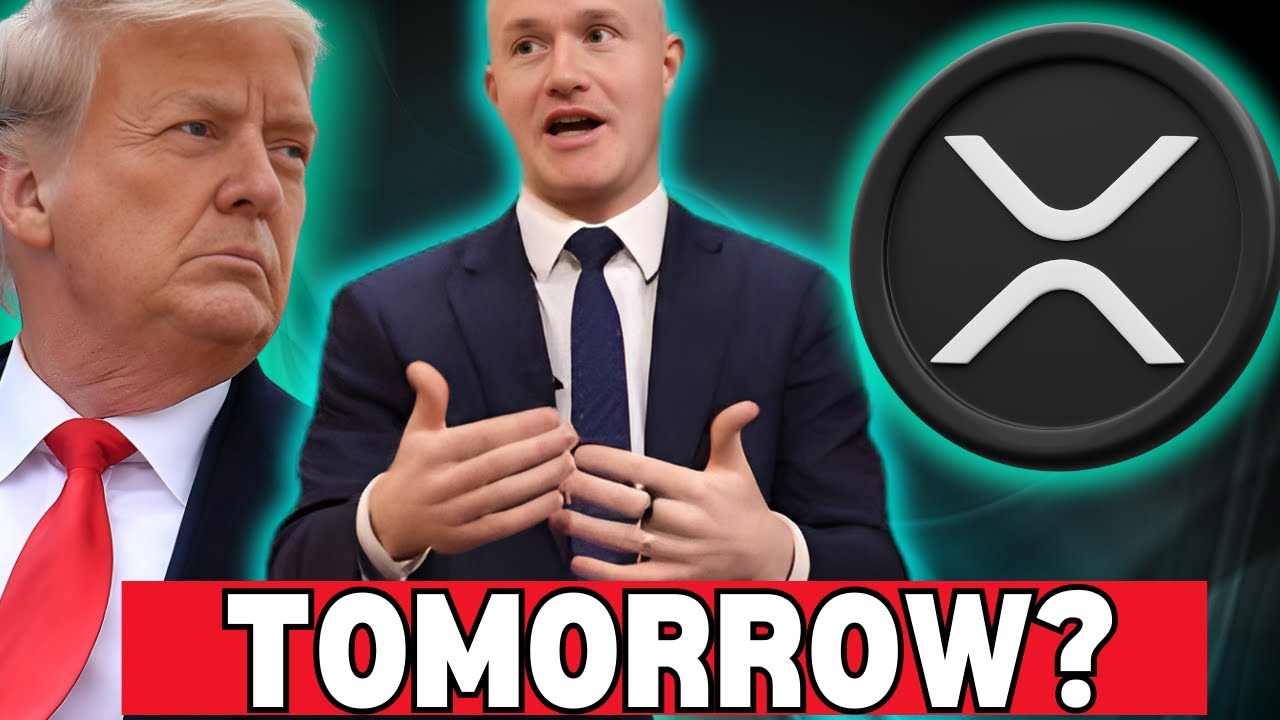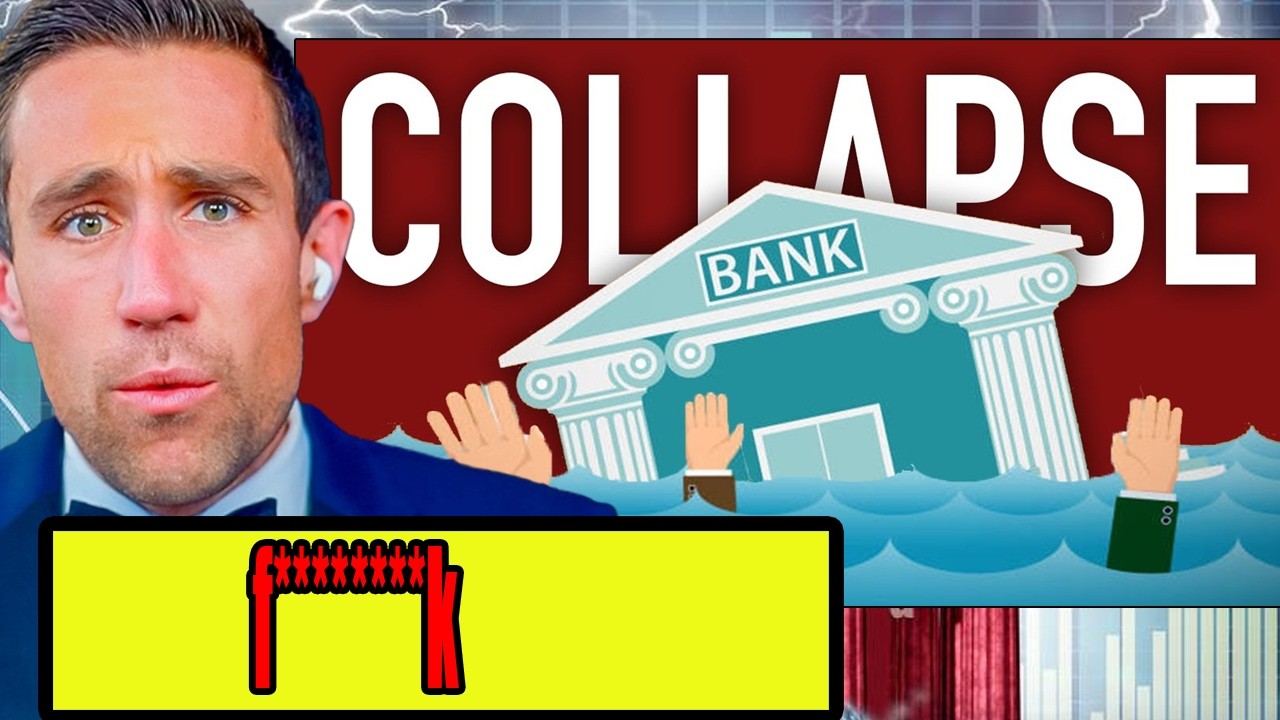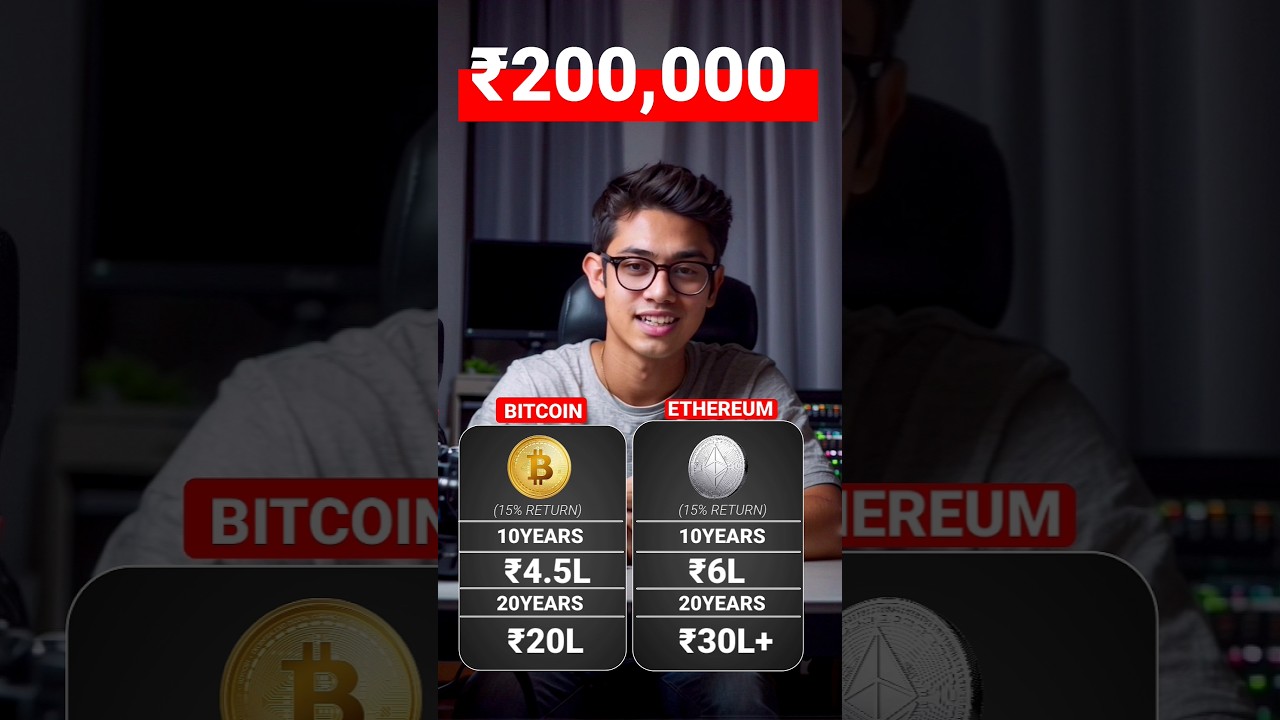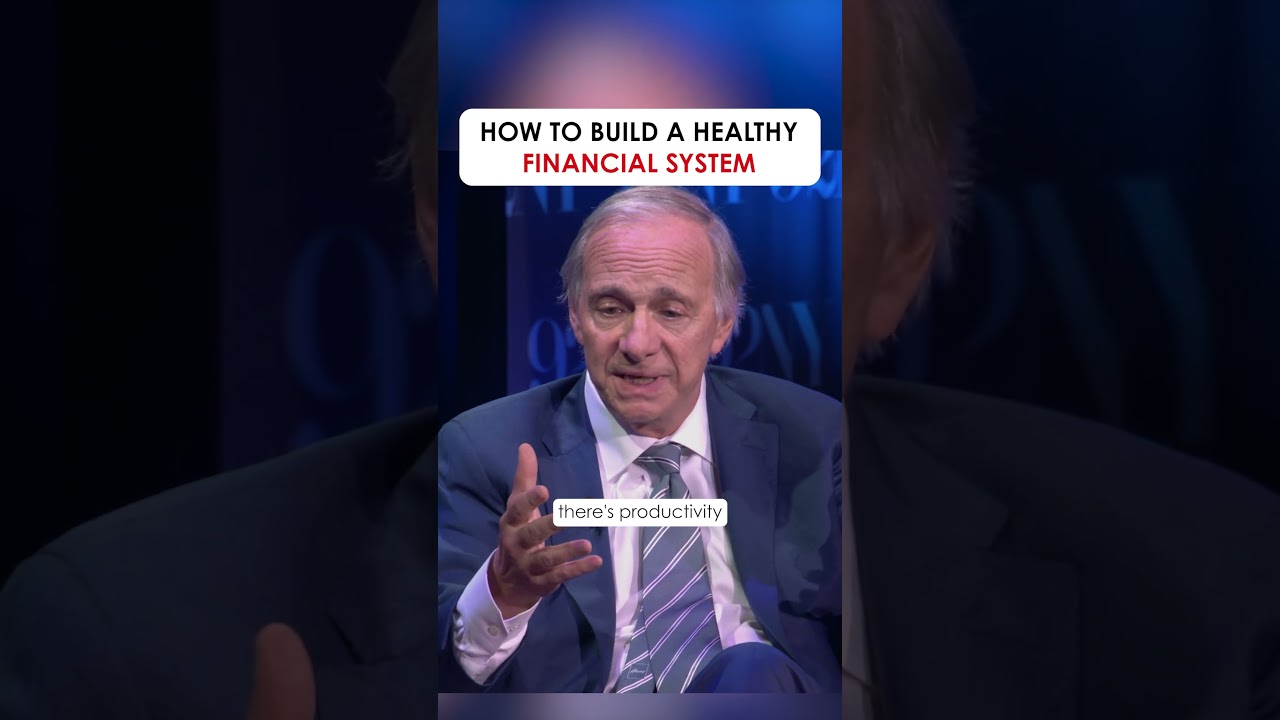Video
XRP JUST IN!! COINBASE CEO ADMITTED THIS ABOUT BANKS! TRUMP DOING IT AGAIN! (TOMMOROW?)

The new Telegram group, join here, it is open and FREE to all – https://t.me/+LoW1GDD5rOI1YjM0
#xrp #xrpnews #xrpripple #cryptonews #crypto
My Website with all my affiliate links (Bydfi, BTCC) where you can get access to the Whale group – https://moneymakeravilev.kit.com/f54fe06808
Follow me on X – https://x.com/MakerLev
DISCLAIMER: Avi Lev, including but not limited to any guests appearing in his videos, are not financial/investment advisors, brokers, or dealers. They are solely sharing their personal experience and opinions; therefore, all strategies, tips, suggestions, and recommendations shared are solely for entertainment and educational purposes. There are financial risks associated with investing, and Avi Lev’s results are not typical; therefore, do not act or refrain from acting based on any information conveyed in this video, webpage, and/or external hyperlinks. For investment advice please seek the counsel of a financial/investment advisor(s), and conduct your own due diligence
Some of the links are affiliate links
COMMENT DISCLAIMER: I WILL NEVER CONTACT YOU IN ANYWAY (ON ANY PLATFORM). IF YOU GET CONTACTED BY ANYONE CLAIMING TO BE ME, IT IS NOT ME. FOR EXAMPLE, COMMENTS SHOWING WHATSAPP NUMBERS ARE NOT ME. ADDITIONALLY, PEOPLE HAVE THE ABILITY TO CALL YOU USING AI TECHNOLOGY SO IT SOUNDS LIKE ME. THIS AGAIN IS NOT ME. NEVER WILL I CONTACT YOU IN ANY WAY. PLEASE DO NOT CLICK ON ANY LINKS IN THE COMMENT SECTION BELOW. DO NOT RESPOND OR INTERACT WITH ANYONE ON ANY PLATFORM CLAIMING TO BE ME OR WORKING ON MY BEHALF – THEY ARE SCAMMERS.
This video is for informational and entertainment purposes only. It does not constitute financial, investment, or trading advice.
I am not a financial advisor. All opinions expressed in this video are my own or those of the individuals referenced.
You should always do your own research and consult with a licensed professional before making any financial decisions.
Cryptocurrency investments carry risk, and past performance is not indicative of future results.
The mention of any price targets, predictions, or market commentary should be understood as opinion — not fact or guarantees
The company’s services and content are not directed to, and are not intended for,residents of Israel
This channel provides global crypto market analysis and educational content in English. Our content is created for a global audience and is NOT intended for, marketed to, or directed at residents of Israel. All content is for informational purposes only and does not constitute financial advice.
tags –
xrp price,xrp price prediction,crypto news,xrp news,xrp ripple,ripple xrp,xrp news today,ripple xrp news,xrp crypto,xrp news today now,xrp today,xrp lawsuit,ripple news,xrp ripple news,xrp analysis,xrp coin,crypto news today,ripple price,xrp 2021,xrp sec,xrp technical analysis,xrp prediction,ripple sec news,cryptocurrency news
xrp price,xrp price prediction,crypto news,xrp news,xrp ripple,ripple xrp,xrp news today,ripple xrp news,xrp crypto,xrp news today now,xrp today,xrp lawsuit,ripple news,xrp ripple news,xrp analysis,xrp coin,crypto news today,ripple price,xrp 2021,xrp sec,xrp technical analysis,xrp prediction,ripple sec news,cryptocurrency news
xrp price,xrp price prediction,crypto news,xrp news,xrp ripple,ripple xrp,xrp news today,ripple xrp news,xrp crypto,xrp news today now,xrp today,xrp lawsuit,ripple news,xrp ripple news,xrp analysis,xrp coin,crypto news today,ripple price,xrp 2021,xrp sec,xrp technical analysis,xrp prediction,ripple sec news,cryptocurrency news
xrp price,xrp price prediction,crypto news,xrp news,xrp ripple,ripple xrp,xrp news today,ripple xrp news,xrp crypto,xrp news today now,xrp today,xrp lawsuit,ripple
source
Video
The Banking Collapse is STARTING | Financial Crisis 2.0.

🚨 Sign up for the Gemini Credit Card: https://Gemini.com/kevin 🚨 ⚠️✅💎 Meet Kevin Membership: https://MeetKevin.com 💎 ✅ ⚠️
⚠️🔥 HouseHack Startup: https://househack.com 🔥⚠️ (Read any solicitation paperwork before investing; investing involves risk – this video is not a solicitation).
🤯💥 Life Insurance Sponsor: https://metkevin.com/life💥🤯
#GeminiCreditCard #CryptoRewards This video is sponsored by Gemini. All opinions expressed by the content creator are their own and not influenced or endorsed by Gemini.
The Bitcoin Credit Card™ is a trademark of Gemini used in connection with the Gemini Credit Card®, which is issued by WebBank. For more information regarding fees, interest, and other cost information, see Rates & Fees: gemini.com/legal/cardholder-agreement
Some exclusions apply to instant rewards; these are deposited when the transaction posts. 4% back is available on up to $300 in spend per month for a year (then 1% on all other Gas, EV charging, and transit purchases that month). Spend cycle will refresh on the 1st of each calendar month. See Rewards Program Terms for details: gemini.com/legal/credit-card-rewards-agreement
Checking if you’re eligible will not impact your credit score. If you’re eligible and choose to proceed, a hard credit inquiry will be conducted that can impact your credit score. Eligibility does not guarantee approval.
The appreciation of cardholder rewards reflects a subset of Gemini Cardholders from 10/08/2021 to 04/06/2025 who held Bitcoin rewards for at least one year. Individual results will vary based on spending, selected crypto, and market performance. Cryptocurrency is highly volatile and may result in gains or losses. This information is for general informational purposes only and does not constitute investment advice. Past performance is not indicative of future results.
😇 Affiliates and Paid Promotions 😇
▀▀▀▀▀▀▀▀▀▀▀▀▀▀▀▀▀▀▀▀▀▀▀▀▀▀
➡️ Life Insurance Sponsor: My favorite life insurance you can get in as litle as 5 minutes! https://metkevin.com/life
➡️ Webull Sponsor: My favorite stock-app for charting and trades! https://metkevin.com/webull
➡️ HSA Sponsor: Tax Deductions via a Health-Savings Account: https://metkevin.com/hsa
➡️ My 360-Camera Sponsor: https://metkevin.com/360x
*See terms and conditions at affiliated webpages. Offers are subject to change. These are affiliated/paid promotions.
🥰 SOCIAL MEDIA & DISCUSSIONS 🥰
▀▀▀▀▀▀▀▀▀▀▀▀▀▀▀▀▀▀▀▀▀▀▀▀▀▀
Twitter / X: https://twitter.com/realMeetKevin
Tik Tok: https://www.tiktok.com/@realmeetkevin
Instagram: https://www.instagram.com/meetkevin
🚀 COURSE INQUIRIES 🚀
▀▀▀▀▀▀▀▀▀▀▀▀▀▀▀▀▀▀▀▀▀▀▀▀▀▀
Email staff@meetkevin.com for course requests or support.
➡️ SPONSORSHIP INQUIRIES ➡️
▀▀▀▀▀▀▀▀▀▀▀▀▀▀▀▀▀▀▀▀▀▀▀▀▀▀
Email meetkevin@creatorsagency.co for sponsorships.
📝 LEGAL DISCLAIMER 📝
▀▀▀▀▀▀▀▀▀▀▀▀▀▀▀▀▀▀▀▀▀▀▀▀▀▀
This video or description does not constitute personalized financial, legal, real estate, investment, or other advice (we don’t know your situation; so it’s impossible to provide you personalized advice.). Therefore, evaluate your own suitability. Assume any referenced product or service is a paid promotion, though Kevin does his best to let ya know if a mention is paid or unpaid. While Kevin’s experience with a product or service may be good, your experience may suck – Kevin can’t be response for that; so be warned and conduct your own diligence. Any mention of stocks or analysis may be reliable today, but not tomorrow or even hours later. Recognize businesses and people change rapidly and the accuracy of information cannot be guaranteed. Additionally, any mention of being a pilot, flying a jet, or showing or commenting on aviation is solely incidental to part-91 flight operations Kevin Paffrath is taking for his own purposes. Any videos of FAA-related or aviation-related content are solely incidental to flights that would have occurred regardless of video content, though some may see the aircraft Kevin flies as an advertisement for the products and services, investment strategies, or wealth strategies Kevin promotes. Kevin Paffrath is licensed with the California Department of Real Estate under 01893132. His broker is HouseHack, license 02236137.
source
Video
I Tested Fake Money from the Dark Web..
Video
Bitcoin vs Ethereum: Which is the Better Investment?

Compare Bitcoin and Ethereum investments with ₹2 lakh at 15% CAGR. Ethereum shows higher growth (₹6L in 10 years, ₹30L+ in 20 years), while Bitcoin offers stability. Understand which cryptocurrency aligns with your risk tolerance and long-term financial goals.
#XRPPricePrediction
#EthereumNews
#BlockchainBattle
#BTC
#AltcoinAnalysis
#BitcoinPricePrediction
#BlockchainInsights
#CryptoShowdown
#EthereumUpdate
#AltcoinInsights
#BTCTrends
#BitcoinAnalysis
#EthereumPricePrediction
#BitcoinNewsToday
#EthereumAnalysis
#PersonalFinance
#EthereumInvesting
#DigitalAssets
#BitcoinElliottWaveAnalysis
#BTCPrice
#ETHNews
#BTCAnalysis
#CryptoMarket
#CryptoNewsToday
#ETHPrice
#Ethereum
#CryptoTradingStrategies
source
Video
Harusnya Mindset KEUANGAN Para Sandwich Generation Tuh Gini! | SUARA BERKELAS #14

Belajar lebih banyak lagi bareng Melvin Mumpuni di: https://lynk.id/finansialku
Solusi mencapai tujuan finansialmu 👉 https://lynk.id/se.uang
Lacak pengeluaranmu dengan Expense tracker 👉 https://lynk.id/se.kelas/qZA9oGd
Hasilin ratusan juta dari industri kreatif 👉 https://lynk.id/edutify/on2D3XA
Baca Buku Generasi Ekspektasi 👉 https://s.shopee.co.id/7fHec5zQqL
Spotify: https://open.spotify.com/show/0u1uZUrZ69mhEhx5N7LcnQ?si=e2961c188ca64fe3
Follow IG dan Submit Pertanyaan: https://www.instagram.com/se.kelas/
Bikin Podcast: https://www.instagram.com/heystudio_id/
#growth #selfdevelopment #uang #kaya
Apa aja yang dibahas Bilal & Melvin?
00:00 Intro
01:50 Fenomena hidup serba konsumtif anak 20an.
07:29 Solusi untuk mencegah pengeluaran yang konsumtif?
09:41 MINDSET menghasilkan duit jadi lebih mudah.
14:11 3 sumber penghasilan.
17:36 Cara mengembangkan sumber penghasilan.
20:15 Definisi aset secara sederhana.
source
Video
Parmish Verma : Time Is Money (Official Video)

Parmish Verma’s “Time Is Money” is the ultimate flex anthem of the year — a hard-hitting banger where he shows off everything he’s earned through hustle and grind. From struggles to success, it’s all about living proof that time really is money.
Streaming Links :
Insta
https://tinyurl.com/3vmbvee5
Spotify
https://tinyurl.com/fjzer3yz
Amazon Music
https://tinyurl.com/y9ff68ps
Apple Music
https://tinyurl.com/vj9dbp4m
Gaana
https://tinyurl.com/4jk4xfje
JioSaavn
https://tinyurl.com/yxfhzx5n
YouTube Music
https://tinyurl.com/3ejnkcwc
Speed Records Presents
🎵- Credits
Song – Time Is Money
Singer – Parmish Verma
Lyrics – Laddi Chahal
Music Composer – Black Virus
Producer – Zorawar
Composer – Laddi Chahal
Mix Master – Dense
🎥 – Credits
Director – Agam Mann & Aseem Mann
Styled by – Medha Bahuguna
Photography – Beej Lakhani
Line Production – Akshay Kapoor
DOP – Shinda Singh
Editor – Mr LUV
Color – Grade Onkar Singh
AD – Rajat Yadav
👨💻 – Credits
Digitally Powered By – Scope Digital
Lyrics :
Birkin moddeyan ch, gutt van cleef ni
Ho hermes pairan ch main karaan ki tareef teri
Sohniye drip di tu layi phiren agg
Teri saheli sadi fan te yaaran da sara jagg
Chori chori takkdi ae mittran di whip nu ni
Kade iced out kade glock de clip nu ni
Navi navi uttari lage jo teri sangh jehi ni
Time is money tu yaaran toh jehda mangdi
Nazaraan milauni ae te naale escape karen
Mittran di ghadi dekh ghadi mudi vape karen
Masti ch lagdi ae phirdi ae jhoomdi ni
Gallan toh ta lagge mainu fan mashroom di
Mainu lagge billo bali ni tu fan-cy
Assi old school kudiye tu gen-z
Akhaan vich nasha thalle personal benz ni
Lean di shukeen kude bali ae trendy ni
Lambo dekh kudi kehndi f*** wow
What when how chalo chhado mitti pao
Ho aari aari aari, ho enni chheti na,
Ho enni chheti nhi khulni sadi whip di tere layi baari
Ho sanu puggdiyan yaariyan
Ho gedi baith ke jihna na jaavan maari
Ho chandigarhon sadhe teen ghante ch dubai
Naal yaar veli kai munde patte fun de
Ghadiyan te gaddiyan da shonk munde nu
Whip tiffany blue wait kre runway
Ho menu puchhan shareek tankhaha meriyan
Ho deni cullinan baapu nu salaha meriyan
Kamm kaar set main le ke jaavan jet
Mainu jithe jithe le ke jaan raahan meriyan
Ho pump rakhde sharir phansi doleyan ch sando
Kari lift g-class te grounded lembo
Har din har waar, shaniwar aitwar
We don’t pray for, we just pray for cars
Ho gardana ghumdiyan jadon shehron langhdi
Ho time is money tu yaaran toh jehda mangdi
Ho time is money tu yaaran toh jehda mangdi
I’m sorry girl
My time is my money
Let’s go boys
Slab
I’m handling some motherf*cking business homie
I hope you talk, you call about money!
Har din har waar, shaniwar aitwar
We don’t pray for, we just pray for cars
Ho gardana ghumdiyan jadon shehron langhdi
Ho time is money tu yaaran toh jehda mangdi
Ho time is money tu yaaran toh jehda mangdi
Like || Share || Spread || Love
Enjoy & stay connected with us!
► Subscribe to Speed Records : http://bit.ly/SpeedRecords
► Like us on Facebook: https://www.facebook.com/SpeedRecords
► Follow us on Twitter: https://twitter.com/Speed_Records
► Follow us on Instagram: https://instagram.com/speedrecords
► Follow on Snapchat : https://www.snapchat.com/add/speedrecords
OldSchoolTieIndia –
https://www.youtube.com/channel/UCX6Xc3BjHWAWSTYkoPwxMx
Speed Records Haryanvi
Youtube: https://bit.ly/2kSrhZK
Instagram: https://www.instagram.com/speedharyanviofficial
punjabi, punjabi music, punjabi latest music, punjabi latest songs, punjabi romantic songs, punjabi sad songs, latest punjabi songs 2024, punjab, speed records, Punjabi Songs, All hit punjabi songs, New punjabi songs 2024, All new punjabi songs 2024, All new latest punjabi songs 2024, Hit punjabi song, Parmish Verma, Time Is Money, Parmish Verma new song, Parmish Verma 2025 song, Time Is Money Parmish Verma, Time Is Money song, Time Is Money Parmish, Parmish Verma flex song, Punjabi flex anthem, Parmish Verma Time Is Money official video, Punjabi rap 2025, Punjabi motivation song, Parmish Verma latest song, Time Is Money Parmish Verma lyrics, Speed Records Parmish Verma, Time Is Money Parmish Verma reaction, Parmish Verma music video, Time Is Money Parmish Verma status, Punjabi hip hop 2025, Time Is Money Parmish reel song, Parmish Verma hard song, Parmish Verma attitude song, Parmish Verma success song, Punjabi trending song, Parmish Verma new video, Parmish Verma lifestyle, Parmish Verma Rolex, Parmish Verma Range Rover, Parmish Verma motivational song
Speed Records Bhojpuri –
Youtube: https://bit.ly/2y8HSez
Instagram: https://bit.ly/2xM2WYL
Snapchat: https://www.snapchat.com/add/speedbhojpuri
Oops TV –
Oops TV Facebook Link – https://m.facebook.com/oopstvfun/
Poon Poon –
Snapchat – https://www.snapchat.com/add/poonpoon0001
Youtube – http://bitly.com/2hwYOnx
Facebook – https://www.facebook.com/officialpoonpoon
Instagram – https://instagram.com/poonpoonofficial
source
Video
Do You Need a Financial Advisor? Find Out Now!

Do You Need a Financial Advisor? Find Out Now!
Jump start your journey with our FREE financial resources: https://moneyguy.com/resources/
Reach your goals faster with our products: https://learn.moneyguy.com/
Subscribe on YouTube for early access and go beyond the podcast: https://www.youtube.com/c/MoneyGuyShow?sub_confirmation=1
Connect with us on social media for more content: https://moneyguy.com/link-in-bio/
Take the relationship to the next level and become a client: https://moneyguy.com/work-with-us/
Bring confidence to your wealth building with simplified strategies from The Money Guy. Learn how to apply financial tactics that go beyond common sense and help you reach your money goals faster. Make your assets do the heavy lifting so you can quit worrying and start living a more fulfilled life.
source
Video
I Got The MONEY BASE In Escape Tsunami For Brainrots…

Join My Roblox Group!
https://www.roblox.com/groups/33043362/The-Techy-ARMY#!/about
Socials: https://solo.to/techys
#Roblox
source
Video
How to Build a Healthy Financial System

If we want to resolve our current income, wealth, and productivity gap, we need to get back to the basics.
We need good education, so our children are productive and can work well together.
We need a civil society with rule of law, and good capital markets that produce good income.
And we need to double down on the fundamentals — earning more than we spend, and having more assets than liabilities.
Do all of that, and we’ll be in great shape.
source
Video
3 Feb | Live Market Analysis for Gold and Crypto | US Session

📢 Join Our Community for Real-Time Updates:
🔹 Telegram : https://telegram.dog/tradersparadise
🔹 Discord : https://discord.gg/tradersparadise
🔹 WhatsApp Support: http://wa.me/919175175615
⸻
🔥Get Access to Free VIP/Indicator/Courses – https://www.tradersparadiselive.com
⸻
💸 Funded Firm Challenge –
👉 Apply – https://my.fundedfirm.com/register?ref=ba9f773acdfed89
⸻
🔥 Top Recommended Brokers 🔥
💰Vantage – Trade with best broker
👉 Sign Up -https://vigco.co/la-com/Paradise
🎯 Use Partner Code: paradise
🎁XM – Trade Forex Globally
👉 Sign Up – https://affs.click/GDCPF
🎯 Use Partner Code: paradise
💰WinproFX – Best Forex Spreads
👉 Register Now – https://my.winprofx.com/register?promo=PARADISE
🎁Delta Exchange – FIU Registered Broker
👉 Start Trading- https://india.delta.exchange/?code=tradersparadise
⸻
⚠️ Disclaimer:
All content is for educational purposes only and not financial advice.
Trading involves risk. Please consult a certified financial advisor before making investment decisions.
Note for Indian Users:
Under FEMA regulations, trading in non-INR currency pairs or through non-SEBI registered brokers is prohibited.
We personally trade via internationally regulated platforms (outside India) such as in Dubai. If you’re based in India, ensure you comply with legal alternatives.
⸻
🔖 Follow & Stay Updated
#forex #cryptotrading #tradersparadiselive #abhaypatil
source
-

 Crypto World5 days ago
Crypto World5 days agoSmart energy pays enters the US market, targeting scalable financial infrastructure
-
Crypto World5 days ago
Software stocks enter bear market on AI disruption fear with ServiceNow plunging 10%
-

 Politics5 days ago
Politics5 days agoWhy is the NHS registering babies as ‘theybies’?
-

 Crypto World5 days ago
Crypto World5 days agoAdam Back says Liquid BTC is collateralized after dashboard problem
-

 Video1 day ago
Video1 day agoWhen Money Enters #motivation #mindset #selfimprovement
-

 NewsBeat5 days ago
NewsBeat5 days agoDonald Trump Criticises Keir Starmer Over China Discussions
-

 Politics2 days ago
Politics2 days agoSky News Presenter Criticises Lord Mandelson As Greedy And Duplicitous
-

 Crypto World4 days ago
Crypto World4 days agoU.S. government enters partial shutdown, here’s how it impacts bitcoin and ether
-

 Sports4 days ago
Sports4 days agoSinner battles Australian Open heat to enter last 16, injured Osaka pulls out
-

 Fashion5 days ago
Fashion5 days agoWeekend Open Thread – Corporette.com
-

 Crypto World4 days ago
Crypto World4 days agoBitcoin Drops Below $80K, But New Buyers are Entering the Market
-

 Crypto World2 days ago
Crypto World2 days agoMarket Analysis: GBP/USD Retreats From Highs As EUR/GBP Enters Holding Pattern
-

 Crypto World5 days ago
Crypto World5 days agoKuCoin CEO on MiCA, Europe entering new era of compliance
-
Business5 days ago
Entergy declares quarterly dividend of $0.64 per share
-

 Sports2 days ago
Sports2 days agoShannon Birchard enters Canadian curling history with sixth Scotties title
-

 NewsBeat1 day ago
NewsBeat1 day agoUS-brokered Russia-Ukraine talks are resuming this week
-

 Tech38 minutes ago
Tech38 minutes agoWikipedia volunteers spent years cataloging AI tells. Now there’s a plugin to avoid them.
-

 NewsBeat2 days ago
NewsBeat2 days agoGAME to close all standalone stores in the UK after it enters administration
-

 Crypto World10 hours ago
Crypto World10 hours agoRussia’s Largest Bitcoin Miner BitRiver Enters Bankruptcy Proceedings: Report
-

 Crypto World5 days ago
Crypto World5 days agoWhy AI Agents Will Replace DeFi Dashboards








